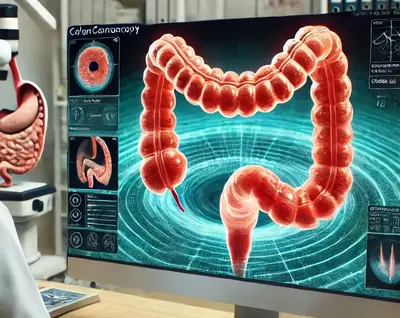Technological advancements in colon cancer screening are improving early detection and patient outcomes.
A New Era of Colon Cancer Detection
Meet Daniel, a 47-year-old father of two, who hadn’t given much thought to colon cancer screening. Like many, he associated the process with discomfort and inconvenience. But after his wife’s persistent reminders and the availability of a new, less invasive screening tool, he decided to take action. Little did Daniel know, this decision could save his life.
Why Early Detection of Colon Cancer Matters
Colon cancer is one of the leading causes of cancer-related deaths worldwide. However, when detected early, the 5-year survival rate is nearly 90%. Advances in medical technology have made colon cancer screening more accessible, accurate, and patient-friendly. The introduction of methods like fecal immunochemical tests (FIT) and CT colonography has allowed many patients, like Daniel, to overcome the barriers traditionally associated with colonoscopies.
The Role of Technology in Colon Cancer Screening
The medical field is experiencing a technological revolution, particularly in cancer screening. Devices, AI, and non-invasive methods are transforming how early detection is conducted. Below are some of the key innovations driving change in colon cancer screening:
1. Fecal DNA Testing
Fecal DNA tests detect genetic markers associated with cancerous or precancerous lesions. For example, a fecal DNA test detected abnormal cells in Monica, a 55-year-old school teacher, during her routine checkup. Because of this early detection, doctors were able to remove the polyps before they developed into cancer.
2. Virtual Colonoscopy
Virtual colonoscopy (CT colonography) uses advanced imaging to create detailed 3D models of the colon. Unlike traditional colonoscopy, this method does not require sedation, making it a viable option for patients who are hesitant about invasive procedures. Michael, a 63-year-old engineer, chose a virtual colonoscopy due to his fear of anesthesia. His test revealed an early-stage polyp that was easily removed.
Benefits of Non-Invasive Colon Cancer Screenings
Non-invasive technologies are not only more comfortable but also highly accurate. The table below summarizes the main differences between traditional and modern colon cancer screening methods:
| Screening Method | Invasiveness | Accuracy Rate | Recommended Frequency | Requires Sedation |
|---|---|---|---|---|
| Traditional Colonoscopy | Invasive | 95% | Every 10 years | Yes |
| Fecal DNA Test | Non-invasive | 92% | Annually | No |
| Virtual Colonoscopy | Non-invasive | 88% | Every 5 years | No |
By leveraging these newer techniques, more patients are likely to undergo screening and improve their chances of catching colon cancer at an early stage.
Colon Cancer Screening: What Experts Say
According to a 2022 study by the American Cancer Society, early detection through screening has been proven to lower the mortality rate from colon cancer by up to 50%. Dr. Emily Walsh from Johns Hopkins University emphasizes, “The evolution of non-invasive screening tools is a game-changer in cancer prevention. It encourages higher participation in screenings.”
Additionally, Dr. James Peters, a gastroenterologist, has noted, “With advanced technology like AI-assisted analysis, we are able to pinpoint abnormalities in real-time, making screening more effective and accessible.”
The Impact of Artificial Intelligence (AI) in Colon Cancer Screening
Artificial Intelligence is another groundbreaking innovation enhancing colon cancer detection. AI algorithms can analyze vast amounts of data, including images from colonoscopies and CT scans, to identify polyps that might be missed by the human eye.
Linda, a 50-year-old marketing executive, was skeptical about AI’s role in medicine until her virtual colonoscopy results were flagged by an AI system. A tiny polyp that might have gone unnoticed was identified and removed during her follow-up procedure. “It’s incredible to think how technology is stepping up where we could have missed critical diagnoses,” she said.
Preparing for the Future of Colon Cancer Screening
With ongoing research and investment in medical technologies, the future of colon cancer screening looks promising. Upcoming innovations, such as liquid biopsies and AI-driven home screening kits, promise to make the process even easier and more efficient.
Experts predict that by 2030, colon cancer screenings will be so advanced that routine colonoscopies might become obsolete. Dr. Karen Sullivan of the Mayo Clinic believes that “integrated AI platforms will soon be able to deliver real-time analysis, reducing the need for invasive procedures.”
Embrace the New Age of Colon Cancer Screening
The evolution of technology in colon cancer screening is making early detection more accessible, less invasive, and more accurate than ever before. By embracing these advancements, patients can take control of their health and potentially save their lives, just like Daniel, Monica, Michael, and Linda. With more awareness and participation, the future of colon cancer prevention looks brighter than ever.









